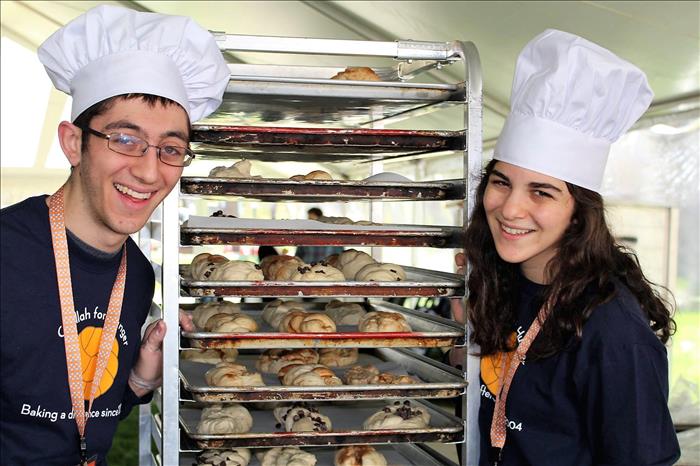Fighting Hunger with Hillel

Roughly 25 percent of college students—one in four—suffer from food insecurity, defined as not having enough nutritious food to eat. Hillel students are rolling up their sleeves to do something about it. Local Hillel chapters are collaborating with Challah for Hunger, a non-profit in which volunteers bake and sell challah loaves, donating the revenue to food charities, to combat hunger.
Challah for Hunger, which had its first sale in 2004 at Scripps College, now operates 82 chapters around the world. At many campuses, Challah for Hunger partners with Hillel, from the University of California, Los Angeles Hillel to the University of Vermont Hillel.
The Edward and Rose Berman Hillel Jewish University Center of Pittsburgh (Hillel JUC) began its partnership with Challah for Hunger more than a decade ago—which current Challah for Hunger CEO Carly Zimmerman founded. At Hillel JUC, students bake challah loaves on Thursdays, and sell the challahs on Fridays—just in time for Shabbat. The affiliated club at Hillel is so active in the community that Hillel JUC created a board position dedicated to Challah for Hunger. This board member brainstorms advocacy projects, including assisting in Hillel Makes a Difference Day, in which the Challah for Hunger chapter bakes challahs on a Sunday, and donates the loaves to Squirrel Hill Community Food Pantry.
Not only are these chapters raising money for local hunger relief charities, but they’re also raising awareness of the issue of hunger, too. At the Pitt Challah for Hunger chapter’s baking sessions, volunteers from service sororities and non-Jewish students learn how to braid challah while learning about hunger in the Pittsburgh area. Volunteers bag the challah loaves and distribute them with facts about hunger relief.
The Pitt Challah for Hunger chapter bakes between 1,500 to 2,000 challah loaves a year, and last year, earned $4,400 in revenue, charging $3 for plain challah and $4 for flavored. The chapter’s best-selling flavors include: cinnamon chocolate babka, tomato pesto, salted caramel and everything bagel.
“Baking is my creative outlet,” said Pitt Challah for Hunger President Brenna Rosen, ‘19. “I didn’t have access to bake in my dorm, but I could bake at Hillel.”
Like other Challah for Hunger chapters, Hillel JUC’s affiliate donates half of its proceeds to MAZON: A Jewish Response to Hunger, a national advocacy organization dedicated to hunger relief. This chapter donates the other half of its proceeds to varying local Pittsburgh hunger relief organizations, including Squirrel Hill Community Food Pantry, 412 Food Rescue and Community Health Services.
“It’s one of the biggest social projects we do,” said Hillel JUC Assistant Director Robyn Markowitz Lawler. “They do really great things across campus.”
Princeton Hillel has a newer Challah for Hunger affiliated chapter, which launched in 2013. Princeton’s Challah for Hunger chapter’s proceeds benefit the Mercer Street Friends Food Bank in Trenton, New Jersey and MAZON: A Jewish Response to Hunger.
The chapter’s founder, senior Renee Zwillenberg, ’17, started the chapter after being inspired by her sister partaking in Challah for Hunger at Cornell, and due to her love for baking.
“I really like the opportunity to give back,” Zwillenberg said. “Princeton has a lot of civic service organizations, but all of them are off campus.” Challah for Hunger bakes at Princeton give students the chance to partake in a service organization on campus, in Hillel, while learning about food insecurity and how to braid challah. “At every bake we talk about hunger and hunger relief,” Zwillenberg added.
Princeton’s Challah for Hunger chapter bakes biweekly on Thursdays, selling out in two hours’ time on Fridays. This chapter generates around $500 per sale, with an estimated $8,000 of revenue in the past four years of its existence on campus. The chapter’s challah flavors include cinnamon sugar, chocolate chip and plain. There’s talk about adding a za’atar flavor, which would taste like the middle-eastern spice.
“My favorite part of Challah for Hunger is meeting people who I wouldn’t have met otherwise,” Zwillenberg said. “The volunteers are passionate about civic service, or baking, and before, didn’t have that outlet on campus.”